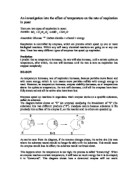Was the Medical Renaissance An Important Period In Medical History.
Was the Medical Renaissance An Important Period In Medical History The Renaissance period was an important time in the progress of medical history. Historians consider that the Middle Ages came to an end when many new and important ideas swept through Europe in the fifteenth and sixteenth centuries. This new period was then known ad the Renaissance. Many people of the time believed that great progress was being made in many fields because the love of knowledge had been re-born. The Renaissance was an important period because discoveries about anatomy were being made. This was a period of time in which many dramatic changes were taking place in the study of anatomy. The single most important figure in this great change is known by his Latin name, Vesalius. Vesalius was lucky enough to have received an excellent medical education and by the time he became a professor at the great Italian medical university, he was only twenty-three years of age. He had access to a regular supply of dead bodies for dissection which helped his study even more. As he carried out more and more dissections he began to have his first doubts about Galen and he concluded that Galen had only carried out dissections on animals. He noticed things such as the human lower jaw was different from Galen's description. Vesalius also wrote a comprehensive book about human anatomy. The development of the
Urban Myth.
Urban Myth It was an early Sunday morning and the sun was out yet the birds were silent and there wasn't a living creature for miles. The red-hot sun beamed down on the ground, scorching the asphalt. Stillness, stillness and silence, suddenly a red, fierce, Ferrari came roaring down the tarmac, with music pumped to the max and foot firmly on the pedal, leaving a trail of dust in its path. Behind the wheel, was a young, beautiful lady with not a worry in the world. Her mobile rang, she was unable to find her mobile she reached into the glove compartment and kept her eyes firmly on the road. With one hand firmly on the steering wheel and one hand in the glove compartment she searched for her mobile. Finally she found something that felt like her mobile and she grabbed it. It was trapped though. She looked down at the glove compartment to see why it was jammed. She realised the mobile is wedged between her CD changer and tracking system. In the process of trying to drag it out she took her eyes off the road, not seeing that there was a sharp bend up ahead. "Got it!" she declares, with her hands up in the air, in the process she spins the steering wheel to the right. The car jerks violently to the right, she hits her head on the window and grabs hold of the steering wheel. She hears tires screeching, she looked up and sees a humongous truck heading straight for her, she glanced
William Harvey.
William Harvey William Harvey was born in 1578, around the time of Shakespeare, and grew to receive a fine education and a degree at Cambridge at the age of 20, and then went on to study in Italy at Padua University, the most prestigious medical university in Europe at that time. He graduated with honours and returned to England in 1602 to return to Cambridge and receive another medical degree from Cambridge. It was then that he decided he had enough education and began to formally practise medicine. Harvey's true passion was circulation. At the time, common belief was that food was absorbed into the liver and then changed into blood, which was used as a fuel for the body. Because of Harvey's studies of the human body involving dissection, he knew that this could not have been true, so he threw himself into working on how the circulatory system worked. In 1928 he published An Anatomical Study of the Motion of the Heart and of the Blood in Animals. In this, he gave explanation to how the heart pumped blood around the body and how it was recirculated. This came to be very controversial due to their unconventional theories, but nonetheless, Harvey later became recognised as a genius of his day. He was even doctor to king Charles 1st. In Harvey's first steps at studying the circulatory system, he deduced that the heart was in fact a muscle, and that it did pump blood around the




















